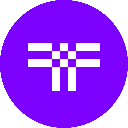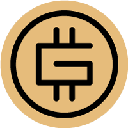-
 Bitcoin
Bitcoin $84,478.9548
-0.59% -
 Ethereum
Ethereum $1,588.4660
-1.26% -
 Tether USDt
Tether USDt $0.9998
-0.01% -
 XRP
XRP $2.0653
-0.83% -
 BNB
BNB $595.5441
0.57% -
 Solana
Solana $133.2985
-1.00% -
 USDC
USDC $0.9999
0.01% -
 Dogecoin
Dogecoin $0.1569
-0.46% -
 TRON
TRON $0.2421
-2.93% -
 Cardano
Cardano $0.6213
-0.90% -
 UNUS SED LEO
UNUS SED LEO $9.0339
0.02% -
 Chainlink
Chainlink $12.5666
-0.71% -
 Avalanche
Avalanche $18.9436
-2.18% -
 Toncoin
Toncoin $3.0025
0.47% -
 Stellar
Stellar $0.2414
0.02% -
 Shiba Inu
Shiba Inu $0.0...01218
2.24% -
 Hedera
Hedera $0.1647
0.69% -
 Sui
Sui $2.1165
-1.27% -
 Bitcoin Cash
Bitcoin Cash $341.8223
1.98% -
 Polkadot
Polkadot $3.6976
1.18% -
 Litecoin
Litecoin $76.3606
0.67% -
 Hyperliquid
Hyperliquid $16.5646
-0.36% -
 Dai
Dai $1.0001
0.00% -
 Bitget Token
Bitget Token $4.4038
1.22% -
 Ethena USDe
Ethena USDe $0.9992
0.01% -
 Pi
Pi $0.6201
0.25% -
 Monero
Monero $217.9977
0.66% -
 Uniswap
Uniswap $5.1770
-1.18% -
 Pepe
Pepe $0.0...07235
-1.89% -
 OKB
OKB $50.4692
-0.20%
What role does an oracle play in the blockchain?
Oracles bridge blockchains to real-world data, enabling smart contracts to use external info for execution, vital for DeFi, insurance, and supply chain management.
Apr 11, 2025 at 08:01 pm

An oracle plays a crucial role in the blockchain ecosystem by acting as a bridge between the blockchain and the external world. Oracles are essential for bringing off-chain data onto the blockchain, enabling smart contracts to interact with real-world information and events. Without oracles, smart contracts would be limited to the data already present within the blockchain network, severely restricting their functionality and practical applications.
What is an Oracle?
An oracle is a service that provides smart contracts with external data. This data can include anything from weather information, stock prices, sports results, to more complex data sets like financial market data or IoT sensor readings. Oracles ensure that the data they supply is accurate and timely, which is critical for the execution of smart contracts that depend on real-world conditions.
How Do Oracles Work?
Oracles function by fetching data from external sources, processing it if necessary, and then relaying it to the blockchain. Here’s a detailed look at how oracles operate:
- Data Request: A smart contract on the blockchain sends a request for specific data to an oracle service.
- Data Retrieval: The oracle accesses the required data from external sources, such as APIs or databases.
- Data Processing: If needed, the oracle processes the data to ensure it is in a format usable by the smart contract.
- Data Transmission: The oracle then transmits the processed data back to the blockchain, where it can be used by the smart contract.
This process ensures that smart contracts can execute based on real-world conditions, making them more versatile and useful.
Types of Oracles
There are several types of oracles, each serving different purposes within the blockchain ecosystem:
- Software Oracles: These oracles fetch data from online sources, such as websites or APIs. They are commonly used for financial data, weather information, and other publicly available data sets.
- Hardware Oracles: These oracles gather data from physical devices, such as IoT sensors. They are useful for applications that require real-time data from the physical world, like supply chain management or environmental monitoring.
- Inbound vs. Outbound Oracles: Inbound oracles bring external data into the blockchain, while outbound oracles send data from the blockchain to external systems. Both types are essential for different use cases within the blockchain ecosystem.
Importance of Oracles in Smart Contracts
Smart contracts are self-executing contracts with the terms directly written into code. They automatically execute actions when predefined conditions are met. Oracles are vital for smart contracts because they provide the external data needed to trigger these conditions. For example, a smart contract for an insurance policy might use an oracle to access weather data to determine if a payout should be made after a natural disaster.
Security and Trust in Oracles
The reliability and security of oracles are paramount, as smart contracts depend on the accuracy of the data they provide. Several mechanisms are in place to ensure the trustworthiness of oracles:
- Decentralized Oracles: To mitigate the risk of a single point of failure, decentralized oracle networks (DONs) use multiple oracles to fetch and validate data. This approach increases the reliability and security of the data provided to smart contracts.
- Reputation Systems: Some oracle networks implement reputation systems where oracles are rated based on their performance and accuracy. This encourages oracles to provide high-quality data.
- Cryptographic Verification: Oracles can use cryptographic techniques to ensure the integrity and authenticity of the data they provide. This includes digital signatures and hash functions to verify data sources.
Use Cases of Oracles in Blockchain
Oracles have a wide range of applications within the blockchain ecosystem. Here are some notable use cases:
- Decentralized Finance (DeFi): In DeFi, oracles are used to provide real-time price data for assets, which is crucial for lending, borrowing, and trading platforms. For example, a lending platform might use an oracle to determine the collateral value of a cryptocurrency.
- Insurance: Oracles can provide data on events like natural disasters or flight delays, which can trigger automatic payouts in insurance smart contracts.
- Supply Chain Management: Oracles can track the movement of goods in real-time, ensuring transparency and efficiency in supply chain operations. For instance, an oracle might provide data from IoT sensors to verify the condition and location of goods.
- Gaming and Betting: In blockchain-based gaming and betting platforms, oracles can provide real-time data on sports results or other events, enabling the automatic execution of bets and payouts.
Challenges and Limitations of Oracles
While oracles are essential for the functionality of smart contracts, they also face several challenges and limitations:
- Data Accuracy: Ensuring the accuracy of data provided by oracles is a significant challenge. Incorrect data can lead to the wrong execution of smart contracts, resulting in financial losses or other issues.
- Security Risks: Oracles can be vulnerable to attacks, such as data manipulation or hacking. Ensuring the security of oracles is crucial to maintaining the integrity of the blockchain ecosystem.
- Scalability: As the demand for oracle services grows, scalability becomes a concern. Oracle networks must be able to handle a high volume of data requests without compromising performance.
- Cost: The use of oracles can incur additional costs, as they often require payment for their services. This can be a barrier for some blockchain applications.
Frequently Asked Questions
Q: Can a blockchain function without oracles?
A: Yes, a blockchain can function without oracles, but its capabilities would be limited to the data already present within the network. Smart contracts would not be able to interact with real-world data, significantly reducing their practical applications.
Q: How do decentralized oracles improve security?
A: Decentralized oracles improve security by using multiple sources to fetch and validate data. This reduces the risk of a single point of failure and increases the reliability of the data provided to smart contracts.
Q: What are some popular oracle services in the blockchain space?
A: Some popular oracle services include Chainlink, which is widely used in the DeFi space, and Band Protocol, which provides a decentralized data platform for various applications. Other notable services include Tellor and Witnet.
Q: How can developers integrate oracles into their smart contracts?
A: Developers can integrate oracles into their smart contracts by using oracle-specific APIs and following the documentation provided by the oracle service. For example, with Chainlink, developers can use the Chainlink API to request data and receive it within their smart contracts.
Disclaimer:info@kdj.com
The information provided is not trading advice. kdj.com does not assume any responsibility for any investments made based on the information provided in this article. Cryptocurrencies are highly volatile and it is highly recommended that you invest with caution after thorough research!
If you believe that the content used on this website infringes your copyright, please contact us immediately (info@kdj.com) and we will delete it promptly.
- Shiba Inu whales shift focus to a new crypto with 10,000% growth potential, sparking major investor interest.
- 2025-04-19 01:20:13
- 4 Cryptos to Watch in 2025: BlockDAG (BDAG), Filecoin (FIL), VeChain (VET), and Chainlink (LINK)
- 2025-04-19 01:20:13
- Dogecoin (DOGE) Sees Massive Spot Market Outflows This April, as Holders Dump Their Stacks
- 2025-04-19 01:15:14
- Canadian Investors Can Now Buy Solana (SOL) as an Exchange-Traded Fund (ETF)
- 2025-04-19 01:15:14
- Coldware (COLD) Price Prediction: Could It Hit $7?
- 2025-04-19 01:10:13
- Straightforward monetary policy decisions may not work in this scenario as lower interest rates would push inflation higher but would help economic activity while higher rates will depress the economy but will keep inflation in check.
- 2025-04-19 01:10:13
Related knowledge
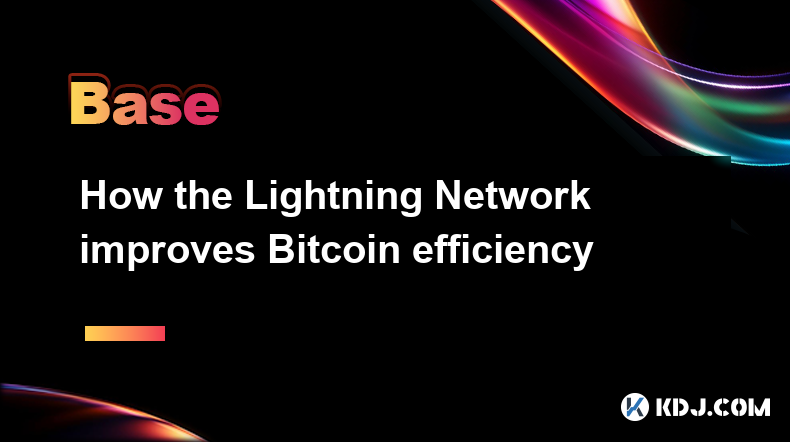
How the Lightning Network improves Bitcoin efficiency
Apr 17,2025 at 08:56pm
The Lightning Network represents a significant advancement in the Bitcoin ecosystem, aiming to address some of the most pressing issues related to transaction speed and cost. By enabling off-chain transactions, the Lightning Network drastically improves Bitcoin's efficiency, allowing for faster and cheaper transactions. This article will explore how the...

Analysis of the KYC process of cryptocurrency exchanges
Apr 17,2025 at 05:07pm
The Know Your Customer (KYC) process is a critical component in the operations of cryptocurrency exchanges. It serves as a regulatory measure to prevent fraud, money laundering, and other illicit activities. KYC procedures are designed to verify the identity of users and ensure compliance with financial regulations. This article delves into the various ...

What does Floor Price mean in the NFT market
Apr 17,2025 at 12:42am
The term Floor Price is a critical concept within the NFT (Non-Fungible Token) market, serving as a key indicator for both buyers and sellers. In essence, the floor price represents the lowest price at which an NFT from a particular collection is currently listed for sale on a marketplace. This price point is crucial for understanding the perceived valu...
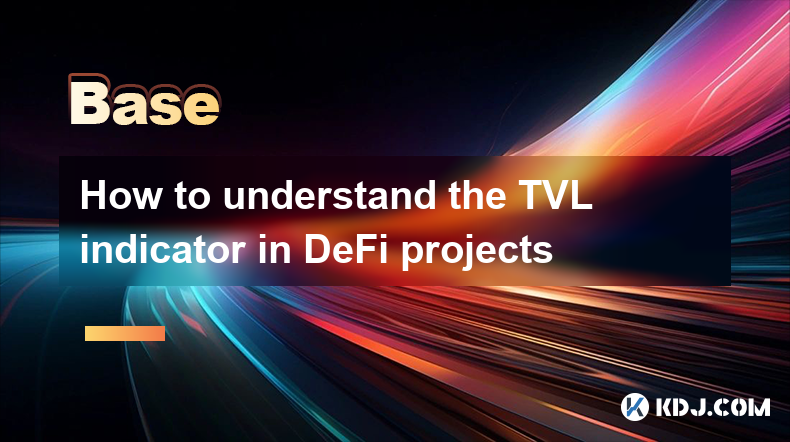
How to understand the TVL indicator in DeFi projects
Apr 17,2025 at 03:28pm
Understanding the TVL indicator in DeFi projects is crucial for investors and enthusiasts looking to gauge the health and popularity of decentralized finance platforms. TVL, or Total Value Locked, represents the total amount of assets that are currently staked or locked in a DeFi protocol. This metric serves as a barometer for the trust and interest tha...

Analysis of the HODL term in digital assets
Apr 18,2025 at 10:28pm
The term HODL has become a cornerstone of the cryptocurrency community, often used with a sense of humor and camaraderie among investors. Originally a typo for 'hold,' HODL has evolved into an acronym standing for 'Hold On for Dear Life.' This article will delve into the origins, significance, and practical implications of HODL within the digital assets...
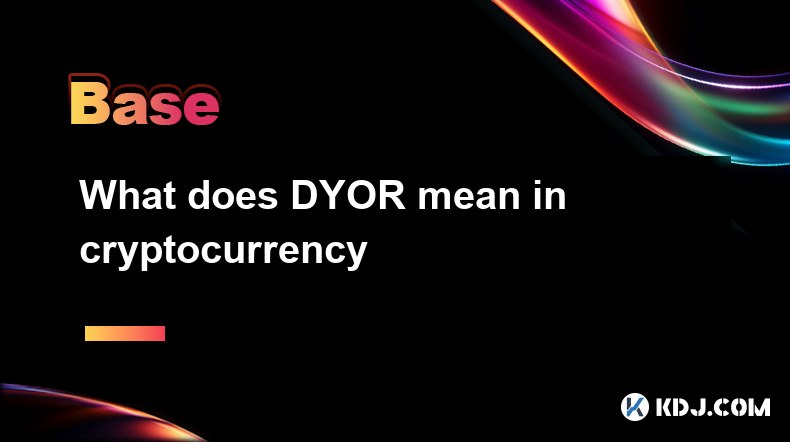
What does DYOR mean in cryptocurrency
Apr 17,2025 at 03:00pm
DYOR, or 'Do Your Own Research,' is a crucial mantra in the cryptocurrency community. It emphasizes the importance of individuals conducting their own thorough investigations before making any investment decisions. In the fast-paced and often volatile world of cryptocurrencies, relying solely on others' advice or the hype surrounding a particular coin c...

How the Lightning Network improves Bitcoin efficiency
Apr 17,2025 at 08:56pm
The Lightning Network represents a significant advancement in the Bitcoin ecosystem, aiming to address some of the most pressing issues related to transaction speed and cost. By enabling off-chain transactions, the Lightning Network drastically improves Bitcoin's efficiency, allowing for faster and cheaper transactions. This article will explore how the...

Analysis of the KYC process of cryptocurrency exchanges
Apr 17,2025 at 05:07pm
The Know Your Customer (KYC) process is a critical component in the operations of cryptocurrency exchanges. It serves as a regulatory measure to prevent fraud, money laundering, and other illicit activities. KYC procedures are designed to verify the identity of users and ensure compliance with financial regulations. This article delves into the various ...

What does Floor Price mean in the NFT market
Apr 17,2025 at 12:42am
The term Floor Price is a critical concept within the NFT (Non-Fungible Token) market, serving as a key indicator for both buyers and sellers. In essence, the floor price represents the lowest price at which an NFT from a particular collection is currently listed for sale on a marketplace. This price point is crucial for understanding the perceived valu...

How to understand the TVL indicator in DeFi projects
Apr 17,2025 at 03:28pm
Understanding the TVL indicator in DeFi projects is crucial for investors and enthusiasts looking to gauge the health and popularity of decentralized finance platforms. TVL, or Total Value Locked, represents the total amount of assets that are currently staked or locked in a DeFi protocol. This metric serves as a barometer for the trust and interest tha...

Analysis of the HODL term in digital assets
Apr 18,2025 at 10:28pm
The term HODL has become a cornerstone of the cryptocurrency community, often used with a sense of humor and camaraderie among investors. Originally a typo for 'hold,' HODL has evolved into an acronym standing for 'Hold On for Dear Life.' This article will delve into the origins, significance, and practical implications of HODL within the digital assets...

What does DYOR mean in cryptocurrency
Apr 17,2025 at 03:00pm
DYOR, or 'Do Your Own Research,' is a crucial mantra in the cryptocurrency community. It emphasizes the importance of individuals conducting their own thorough investigations before making any investment decisions. In the fast-paced and often volatile world of cryptocurrencies, relying solely on others' advice or the hype surrounding a particular coin c...
See all articles


















































































